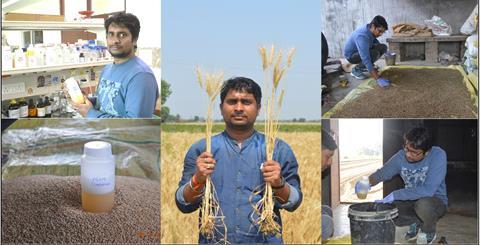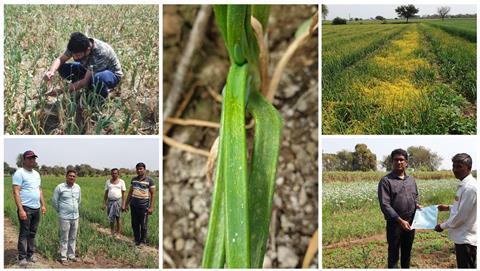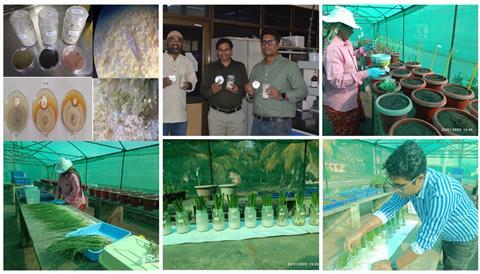The Microbiologist gets to know our Global Ambassador for India, Dr. Durgesh Kumar Jaiswal, who is Assistant Professor at the Department of Biosciences, Graphic Era University, Dehradun, specializing in microbial biotechnology and sustainable agriculture.

He holds a Ph.D. from the Institute of Environment & Sustainable Development, Banaras Hindu University, India, and has worked as a Postdoctoral Fellow at Savitribai Phule Pune University, Pune, India. His research focuses on agro-microbial biotechnology, aiming to improve crop production, soil health, and disease management while addressing environmental sustainability.
Dr. Jaiswal has received prestigious awards including the Dr. D.S. Kothari Postdoctoral Fellowship and the ASM-Future Leaders Mentorship Fellowship. He is also recognized by the NASI-Swarna Jayanti Puraskar Award for his research contributions. Additionally, he serves as an editorial board member for international journals and is involved in various global sustainability initiatives.
What first sparked your love of microbiology?
My fascination with microbiology was sparked during my undergraduate years when I first gazed through a microscope and discovered the vibrant world hidden within a single drop of pond water. Witnessing these tiny, unseen organisms—so powerful in their influence—captivated me. I became enthralled by the idea that microbes, though invisible to the naked eye, play a crucial role in shaping our environment, from supporting plant growth to purifying polluted ecosystems.
As I explored further, I realized the immense potential of using beneficial microbes to transform agriculture and rehabilitate degraded soils. This insight turned my curiosity into a sense of purpose. Every new achievement in the lab, whether engineering a plant probiotic or developing a bioremediation strategy, felt like unveiling a new tool for environmental stewardship.
What truly fuels my passion is witnessing these innovations make a tangible difference for farmers, boosting crop productivity and restoring ecological balance. For me, microbiology is more than a scientific discipline; it is a journey of discovery, one that fosters a positive impact and hopes for building a sustainable future.
What’s the microbe that most fascinates you and why?
I am deeply fascinated by plant growth-promoting microorganisms (PGPMs) and entomopathogenic fungi (EPFs) because of their dynamic and synergistic roles in advancing sustainable agriculture. PGPMs are natural soil architects that significantly enhance crop productivity, soil fertility, and stress resilience through mechanisms like phosphate solubilization, nitrogen fixation, siderophore production, and phytohormone synthesis.
Species such as Microbacterium hydrocarbonoxydans, Bacillus subtilis, and Pseudomonas fluorescens not only support robust plant growth but also play a crucial role in detoxifying pesticide-laden soils.

The study implied that over-application of agrochemicals and their toxicity could significantly disturb the soil structure and fertility, microbial communities, reduction of biofertilizer efficacy and crop yields, thereby posing a serious challenge for minimizing the application of agrochemicals and their toxicity and reducing the pesticide residues in soil systems and food.
On the other hand, entomopathogenic fungi (EPFs)—such as Beauveria bassiana, Metarhizium anisopliae, and Trichoderma viride—are equally intriguing for their eco-friendly role in integrated pest and disease management (IPDM) strategies. These fungi effectively target and suppress onion pests, such as thrips (Thrips tabaci), and fungal diseases, including purple blotch (Alternaria porri), by penetrating the host cuticle and releasing hydrolytic enzymes.
This approach offers a sustainable and biologically sound alternative to chemical pesticides, preserving ecological integrity. This technology can help achieve higher yields, maintain soil sustainability under the organic farming system, and provide a new arena for budding entrepreneurs to invest in agribusiness start-ups. Therefore, the study can be applied to the SDGs of zero hunger (2.2 & 2.3), sustainable economic growth (3.8), and land life (15.1). What inspires me most is the need for translating knowledge from the lab to the field, making the practical application of this research a reality.

Currently, my research is under the NMHS-funded project titled “Sustainable Utilisation of Invasive Plant Biomass for Bioactive Component Recovery and Biochar Generation: A Unique Solution for Improving Rural Livelihoods in Uttarakhand” (2025–2027). This project, with its potential to transform invasive plant biomass into valuable bioactive compounds and biochar, is a significant step towards enhancing both environmental sustainability and rural livelihoods in Uttarakhand. Your support and interest in this project are crucial.
Additionally, I am privileged to supervise two outstanding PhD scholars, Gulafsha Parveen and Pavita Thapa, whose research aligns with my passion for sustainable agriculture through microbial innovation. The study focuses on “Unlocking Antifungal Metabolites Derived from Endophytic Bacteria Against Fusarium graminearum: Sustainable Wheat Disease Management.” She is exploring the potential of endophytic bacteria to produce antifungal compounds, offering an eco-friendly strategy for managing wheat diseases and “Sustainable Tea Cultivation Using Mycorrhizal Biofertilizer.” She is investigating the role of mycorrhizal biofertilizers in enhancing the health and sustainability of tea crops, reducing chemical inputs and promoting soil health.
What’s the best career advice you’ve ever been given?
The best career advice I’ve received is to “always be open to learning and adaptability” and to “pursue research that aligns with your passion and interests.” This advice has guided me throughout my academic and professional journey, allowing me to stay focused on my goals and continue to grow as a researcher.
What real-world problem would you eventually love to solve with microbiology?
One real-world problem I am determined to address through the promising field of microbiology is enhancing crop resilience in the face of climate change, a challenge that directly impacts global food security for our growing population. Climate variability and extreme weather events threaten not only crop yields and quality but also soil health, undermining the foundation of sustainable agriculture.
My research demonstrates that beneficial microbes, such as PGPMs, endophytes, and microbial consortia, hold significant potential to bolster plant tolerance to drought, salinity, and other abiotic stresses by modulating physiological and molecular responses. However, a major hurdle remains: translating these promising laboratory results into practical, field-ready solutions. Your support is crucial in this endeavour.

My goal is to develop robust, multi-functional microbial technologies that can be reliably deployed in real agricultural settings, empowering farmers to sustain productivity even under climate-related stress. By bridging the gap between lab research and field-scale adoption, I aim to support sustainable agriculture and ensure food security for an expanding global population in a changing climate.
What keeps you awake at night?
What keeps me awake at night is the urgent need to translate our laboratory breakthroughs in agro-microbial biotechnology into real-world solutions that benefit farmers and the environment. The challenge of ensuring that our research, whether it involves enhancing crop resilience under climate change, bioremediating agrochemical pollutants, or formulating effective microbial consortia, extends beyond publications and patents to make a tangible impact on food security, soil health, and rural livelihoods, is both motivating and daunting.
I am driven by questions like: How can we streamline the lab-to-field application process? What more can be done to ensure that innovative microbial solutions are accessible, affordable, and effective for farmers facing real challenges on their land?
Ultimately, the responsibility to bridge this gap, mentor the next generation of scientists, and contribute to a more sustainable and resilient agricultural future is what keeps me awake and inspires me to keep pushing the boundaries of my research.
What do you do to relax in your spare time?
I enjoy reading, travelling, photography and painting. These activities help me connect with nature and maintain a healthy work-life balance.
Why did you apply to become a Global Ambassador, and what would you like to do in your new role?
I applied to become a Global Ambassador to promote sustainable agriculture and environmental sustainability through the field of microbiology. As a Global Ambassador, I aim to collaborate with researchers and organisations worldwide to develop innovative solutions for sustainable agriculture and environmental sustainability. I also aim to raise awareness about the importance of microbiology in sustainable agriculture and environmental sustainability and to mentor and train the next generation of researchers and scientists.
I applied to become a Global Ambassador because I am deeply passionate about advancing the field of microbiology and believe in the power of international collaboration to address global challenges in agriculture, environment, and health. Throughout my doctoral and post-doctoral journey, and now as an Assistant Professor, I have witnessed firsthand the transformative potential of microbiology—from developing efficient microbial systems for sustainable agriculture to mentoring young scientists in cutting-edge research.
As a Global Ambassador, I aim to build strong networks between researchers, institutions, and industry partners across borders, facilitating knowledge mentoring and inspiring early-career scientists, creating opportunities for students and early-career researchers to engage in global scientific communities, access training, and participate in international conferences and workshops; organize seminars, webinars, and outreach programs to highlight the critical role of microbiology in addressing food security, environmental sustainability, and public health; and ensure that voices from underrepresented regions and backgrounds are included in global scientific dialogues.
In this new role, I look forward to being a bridge between the local and global microbiology communities, sharing innovative research from India, and learning from diverse perspectives worldwide. Ultimately, my goal is to contribute to a more sustainable, resilient, and interconnected scientific future.
We are also looking for Global Ambassadors from a variety of regions! To find out more, click HERE.
Topics
- Agriculture
- Alternaria porri
- Applied Microbiology International
- Asia & Oceania
- Bacillus subtilis
- Bacteria
- Banaras Hindu University
- Beauveria bassiana
- Bioremediation
- Climate Action
- Community
- Durgesh Kumar Jaiswal
- entomopathogenic fungi
- Food Security
- Fungi
- Fusarium graminearum
- Gulafsha Parveen
- Healthy Land
- Metarhizium anisopliae
- Microbacterium hydrocarbonoxydans
- Microbial Biotechnology
- mycorrhizal biofertilizer
- Pavita Thapa
- People News
- Pesticides
- plant growth-promoting microorganisms
- Pseudomonas fluorescens
- Savitribai Phule Pune University
- Soil & Plant Science
- Sustainable Microbiology
- Thrips tabaci
- Trichoderma viride







No comments yet